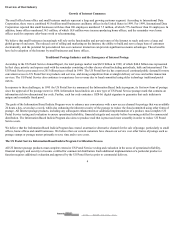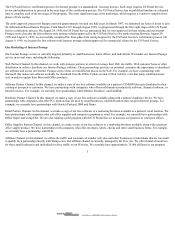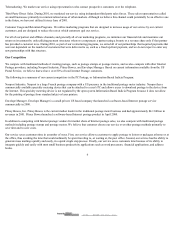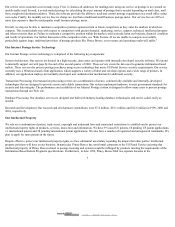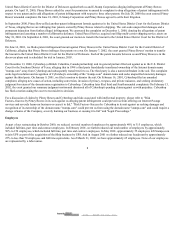Stamps.com 2001 Annual Report Download - page 17
Download and view the complete annual report
Please find page 17 of the 2001 Stamps.com annual report below. You can navigate through the pages in the report by either clicking on the pages listed below, or by using the keyword search tool below to find specific information within the annual report.
If Cybershop prevails in its claims against us, we may be liable for monetary damages. Additionally, if Cybershop is successful in the lawsuit,
we may be required to relinquish the domain name stamps.com and transfer the domain name registration to Cybershop. Relinquishing
ownership of the stamps.com domain name would require us to use a different domain name as the primary Internet address and web page for
our company, and we may need to change the name of our company itself from Stamps.com Inc. as well. Changing the name of our company,
and using a new Internet domain name, could significantly and negatively affect our brand recognition and customer acquisition and retention.
Furthermore, a change in our company name or Internet domain name could result in significant costs in seeking to build new brand
recognition. Thus, if Cybershop prevails in its suit against us, our business could be severely harmed or even fail. See "Legal Proceedings" for a
description of litigation in which we are involved.
Even if Cybershop's claim is unsuccessful, the Cybershop litigation could result in significant expenses and diversion of management time and
other resources that could negatively affect our business.
Third party assertions of violations of their intellectual property rights could adversely affect our business.
Substantial litigation regarding intellectual property rights exists in our industry. Third parties may currently have, or may eventually be issued,
patents upon which our products or technology infringe. Any of these third parties might make a claim of infringement against us. We may
become increasingly aware of, or we may increasingly receive correspondence claiming, potential infringement of other parties' intellectual
property rights. We could incur significant costs and diversion of management time and resources to defend claims against us regardless of their
validity. We may not have adequate resources to defend against these claims and any associated costs and distractions could have a material
adverse effect on our business, financial condition and results of operations. In addition, litigation in which we are accused of infringement
might cause product development delays, require us to develop non-infringing technology or require us to enter into royalty or license
agreements, which might not be available on acceptable terms, or at all. If a successful claim of infringement were made against us and we
could not develop non-infringing technology or license the infringed or similar technology on a timely and cost- effective basis, our business
could be significantly harmed or fail. Any loss resulting from intellectual property litigation could severely limit our operations, cause us to pay
license fees, or prevent us from doing business. See "Legal Proceedings".
A failure to protect our own intellectual property could harm our competitive position.
We rely on a combination of patent, trade secret, copyright and trademark laws and contractual restrictions, like confidentiality agreements and
licenses, to establish and protect our rights in our products, services, know-how and information. We have 39 issued US patents, 68 pending US
patent applications, 11 international patents and 28 pending international patent applications. We also have a number of registered and
unregistered trademarks. We plan to apply for more patents in the future. We may not receive patents for any of our patent applications. Even if
patents are issued to us, claims issued in these patents may not protect our technology. In addition, a court might hold any of our patents,
trademarks or service marks invalid or unenforceable. Even if our patents are upheld or are not challenged, third parties may develop alternative
technologies or products without infringing our patents. If our patents fail to protect our technology or our trademarks and service marks are
successfully challenged, our competitive position could be harmed. We also generally enter into confidentiality agreements with our employees,
consultants and other third parties to control and limit access and disclosure of our confidential information. These contractual arrangements or
other steps taken to protect our intellectual property may not prove to be sufficient to prevent misappropriation of technology or deter
independent third party development of similar technologies. Additionally, the laws of foreign countries may not protect our services or
intellectual property rights to the same extent as do the laws of the United States.
14
2002. EDGAR Online, Inc.


